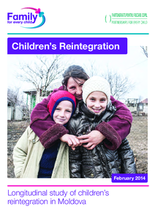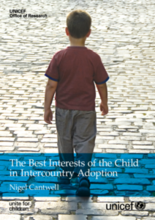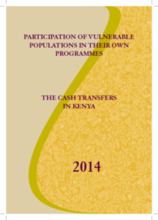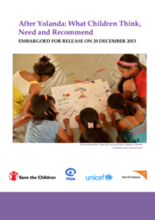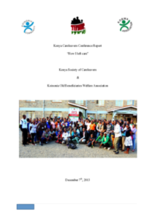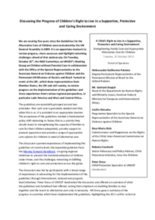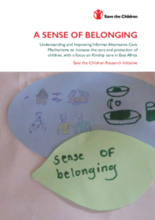Displaying 231 - 240 of 377
This paper presents the findings of a survey of Russian care leavers. The emphasis is on care leavers' experiences of the Russian institutional care system, and the issues that impacted on their postcare transition to adulthood.
This important report documents a 22-month longitudinal study of the reintegration of children in residential care in Moldova.
Through participatory information gathering tools, War Child Holland implemented a Child Right Situation Analysis to discuss and analyze the issues identified by Syrian children as the most important to them.
This study, conducted by Nigel Cantwell and UNICEF, seeks to answer the question: “what is it that enables a policy, process, decision or practice to be qualified as either respectful or in violation of the best interests of the child in intercountry adoption?”
This report presents the findings of an audit of the cash transfer programs for the Orphans and Vulnerable Children (OVC), Persons with Severe Disability (PWSD), and the Elderly in 21 sub-counties of Kenya, to provide the national and county governments with a snap shot account of the implementation of the cash transfer program and the level of participation of the vulnerable populations in programs designed for them.
On 14th December, Save the Children, Plan, World Vision, working with UNICEF, organized consultations with 124 children and young people in Capiz, Cebu, Iloilo, Leyte and East and West Samar to listen to their views about the humanitarian situation six weeks after the Typhoon, find out what their priorities are and ask for suggestions to improve the response.
The aim of this article is to examine unaccompanied minors’ experiences of leaving care in Sweden, and to explore the experience in relation to perceptions about ethnicity and culture within a transnational space.
Koinonia Old Beneficiaries Welfare Association and Kenya Society of Careleavers report on their annual Careleavers Conference that took place on December 7th, 2013 at the Shalom House, Dagoretti Corner.
On Tuesday, October 22rd, the NGO Committee on UNICEF’s Working Group on Children without Parental Care in collaboration with the Office of the Special Representative to the Secretary-General on Violence against Children and the Permanent UN Missions of Austria and Brazil hosted an event at the UN, which drew representatives from Member States, the UN and civil society, to review progress on the implementation of the guidelines and share experiences from various regional perspectives.
A report by Save the Children examining the role and extent of kinship care in West Central Africa, as well as looking into program and policy implications and gaps in advocacy.

